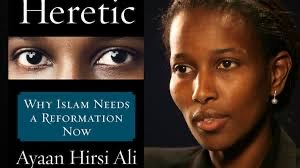Ayaan Hirsi Ali
11/13/1969–Present
(Continued)
After the 2015 Paris attacks, Hirsi Ali stated that American and European governments needed to understand that Islamic fundamentalism was an ongoing threat to Westernized society. She spoke against the radicals who hide among the majority of peaceful Muslims, and said that Western leaders must stop downplaying the link between Islam and Islamic terrorism. Hirsi Ali considers those who take the Quran and the dictates of the Prophet Muhammed literally as dangerous.
Between 2006 and 2015, Ayaan authored four books that were published in English: The Caged Virgin: An Emancipation (2006); Infidel: My Life (2007); Nomad: From Islam to America (2010); and Heretic: Why Islam Needs a Reformation Now (2015).
In her 2016 presentation at Prager University, Hirsi Ali asserted that a reform of Islam was vital; in its current form it couldn’t be considered a religion of peace, as it justified violence against homosexuals, apostates, and those deemed guilty of blasphemy. In 2017 she wrote and spoke of how Da’wah (the act of inviting or calling people to embrace Islam) is often a step to Islamism (the reform movement that advocates the reordering of government and society in accordance with laws prescribed by Islam). She said that this concept is a “subversive, indoctrinating precursor to jihad… and “places Muslims in opposition to Western civic ideals.”
Between 2004 and 2017 Hirsi Ali received twenty awards, largely for her courageous outspokenness, her intellect, and her contributions to society. In 2017 she testified at the U.S. Senate Committee on Homeland Security and Government Affairs. That year also marked the tenth anniversary of her AHA foundation. She deserves some of the credit for its achievements, which include: 1) the successful advocacy of three federal bills passed into law and twenty state bills in seven states criminalizing and protecting girls from FGM; 2) helping individuals facing domestic violence; 3) helping over 260 women and girls find safety in situations of honor violence.
Now in 2020 Hirsi Ali has a buildup of many prominent admirers and prominent detractors. The admirers, of whom I am one, agree with the American novelist and screen writer, Roger L. Simon, who calls her “one of the great positive figures of our time, a modern Joan of Arc who surpasses the original Joan in a moral sense and is at least her equal in pure guts.” Journalist Christopher Hitchens regarded her as “the most important public intellectual probably ever to come out of Africa.” Patt Morrison of The Los Angeles Times called Hirsi Ali a freedom fighter for feminism who has “put her life on the line to defend women against radical Islam.”
Her detractors include many Islamists and the so-called feminist Germaine Greer who argues that FGM needs to be considered a “cultural identity” that Western women don’t understand. My response is that Ms. Greer has been an iconoclast of the man’s world of “cultural identity” since 1970 when she authored The Female Eunuch, which supports women’s adoption of submissive roles to fulfill male fantasies. I also find it puzzling that that many “Queer Feminists” side against Hirsi along with openly homophobic Islamists, and that some straight feminists think she’s strengthened racism despite her dark African skin color.
She’s also accused of “Orientalism” because she is pro-assimilation, having stated that Aboriginals, Afghanis, Somalis, Arabs, and Native Americans should transition to modernity. Nor is she popular with ultra-Orthodox Jews for noting their tendency to have more children than the secular and conventional Orthodox Jews. The Palestinians hate her because she condemns the Palestinian Authority as corrupt, whereas she admires Israel as a liberal democracy.
To end on a positive note for this magnificent woman, I quote conservative syndicated opinion columnist, TV guest commentator, and author Rich Lowry:
Ayaan Hirsi Ali should be the perfect feminist hero. Viewed from a certain level of abstraction, it is hard to imagine one person who fits the role on so many levels: She’s an escapee—literally—from an abusive patriarchy. She’s an African immigrant who made her own way in a Western country, the Netherlands, starting from nothing. She’s a fierce advocate for women’s rights. She’s a target for deadly violence by angry men who want to shut her up. She left her religion and became a scourge of its repressive practices.
All this—her searing personal experience, her Third World background, her secularism—would seem to make her a rock star of contemporary feminism, except for the blemish on her record: Ayaan Hirsi Ali is a dissident from the wrong religion.

